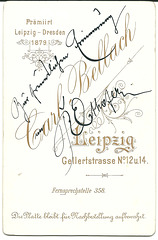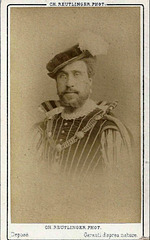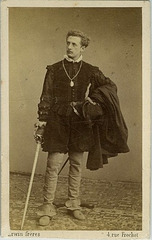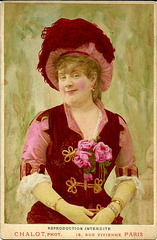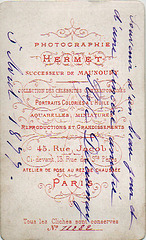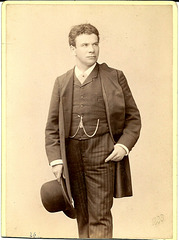
19TH CENTURY OPERA SINGERS
Nellie Melba by Reutlinger
| |
|
Melba as Rosina "Barber of Saville" by Rossini
Dame NELLIE MELBA GBE
(Helen Porter Mitchell)
(19 May 1861 – 23 February 1931),
Australian Soprano
Melba was taught to play the piano and first sang in public around age six.She was educated at a local boarding school and then at the Presbyterian Ladies' College. She studied singing with Mary Ellen Christian (a former pupil of Manuel García) and Pietro Cecchi, an Italian tenor, who was a respected teacher in Melbourne. In her teens, Melba continued to perform in amateur concerts in and around Melbourne, and she played the organ at church. Making her professional debut in Melbourne concerts in 1884. On the strength of local success, she travelled to London in search of an opportunity.Her debut at the Princes' Hall in 1886 made little impression, and she sought work unsuccessfully from Sir Arthur Sullivan, Carl Rosa and Augustus Harris.She then went to Paris to study with the leading teacher Mathilde Marchesi, who instantly recognised the young singer's potential: Melba made such rapid progress that she was allowed to sing the "Mad Scene" from Ambroise Thomas's Hamlet at a matinée musicale in Marchesi's house in December the same year, in the presence of the composer.Her talent was so evident that, after less than a year with Marchesi, the impresario Maurice Strakosch gave her a ten-year contract at 1000 francs annually. After she had signed, she received a far better offer of 3000 francs per month from the Théâtre de la Monnaie, Brussels, but Strakosch would not release her and obtained an injunction preventing her from performing .The matter was resolved by Strakosch's sudden death.She made her operatic debut four days later as Gilda in Rigoletto at La Monnaie on 12 October 1887.. It was at this time, on Marchesi's advice, that she adopted the stage name of "Melba", a contraction of the name of her home city.Her Covent Garden début in May 1888, in the title role in Lucia di Lammermoor. She received a friendly but not excited reception The following year, she performed at the Opéra in Paris, in the role of Ophélie in Hamlet; She travelled across Europe to St Petersburg to sing for Tsar Nicholas II: and sang in Paris, Brussels, Vienna , Milan, and Berlin Melba sang the role of Nedda in Pagliacci at Covent Garden in 1893, soon after its Italian premiere. The composer was present, and said that the role had never been so well played before.[19] In December of that year, Melba sang at the Metropolitan Opera in New York for the first time. As at her Covent Garden debut, she appeared as Lucia di Lammermoor, Her Roles included mostly in the lyric soprano repertoire, but with some heavier roles also. She sang the title roles in Herman Bemberg's Elaine and Arthur Goring Thomas's Esmeralda. Her Italian parts included Gilda in Rigoletto, the title role in Aida Desdemona in Otello, Luisa in Mascagni's I Rantzau, Nedda in Pagliacci, Rosina in The Barber of Seville, Violetta in La traviata, and Mimi in La bohème. In the French repertoire, she sang Juliette in Roméo et Juliette, Marguerite in Faust, Marguerite de Valois in Les Huguenots, the title role in Saint-Saëns's Hélène, which was written for her, and Micaëla in Carmen.
Nellie Melba by Reutlinger
| |
|
Melba as Marguerite "Faust" by Gounod
Dame NELLIE MELBA GBE
(Helen Porter Mitchell)
(19 May 1861 – 23 February 1931),
Australian Soprano
Melba was taught to play the piano and first sang in public around age six.She was educated at a local boarding school and then at the Presbyterian Ladies' College. She studied singing with Mary Ellen Christian (a former pupil of Manuel García) and Pietro Cecchi, an Italian tenor, who was a respected teacher in Melbourne. In her teens, Melba continued to perform in amateur concerts in and around Melbourne, and she played the organ at church. Making her professional debut in Melbourne concerts in 1884. On the strength of local success, she travelled to London in search of an opportunity.Her debut at the Princes' Hall in 1886 made little impression, and she sought work unsuccessfully from Sir Arthur Sullivan, Carl Rosa and Augustus Harris.She then went to Paris to study with the leading teacher Mathilde Marchesi, who instantly recognised the young singer's potential: Melba made such rapid progress that she was allowed to sing the "Mad Scene" from Ambroise Thomas's Hamlet at a matinée musicale in Marchesi's house in December the same year, in the presence of the composer.Her talent was so evident that, after less than a year with Marchesi, the impresario Maurice Strakosch gave her a ten-year contract at 1000 francs annually. After she had signed, she received a far better offer of 3000 francs per month from the Théâtre de la Monnaie, Brussels, but Strakosch would not release her and obtained an injunction preventing her from performing .The matter was resolved by Strakosch's sudden death.She made her operatic debut four days later as Gilda in Rigoletto at La Monnaie on 12 October 1887.. It was at this time, on Marchesi's advice, that she adopted the stage name of "Melba", a contraction of the name of her home city.Her Covent Garden début in May 1888, in the title role in Lucia di Lammermoor. She received a friendly but not excited reception The following year, she performed at the Opéra in Paris, in the role of Ophélie in Hamlet; She travelled across Europe to St Petersburg to sing for Tsar Nicholas II: and sang in Paris, Brussels, Vienna , Milan, and Berlin Melba sang the role of Nedda in Pagliacci at Covent Garden in 1893, soon after its Italian premiere. The composer was present, and said that the role had never been so well played before.[19] In December of that year, Melba sang at the Metropolitan Opera in New York for the first time. As at her Covent Garden debut, she appeared as Lucia di Lammermoor, Her Roles included mostly in the lyric soprano repertoire, but with some heavier roles also. She sang the title roles in Herman Bemberg's Elaine and Arthur Goring Thomas's Esmeralda. Her Italian parts included Gilda in Rigoletto, the title role in Aida Desdemona in Otello, Luisa in Mascagni's I Rantzau, Nedda in Pagliacci, Rosina in The Barber of Seville, Violetta in La traviata, and Mimi in La bohème. In the French repertoire, she sang Juliette in Roméo et Juliette, Marguerite in Faust, Marguerite de Valois in Les Huguenots, the title role in Saint-Saëns's Hélène, which was written for her, and Micaëla in Carmen.
Nellie Melba by Unknown
| |
|
Dame NELLIE MELBA GBE
(Helen Porter Mitchell)
(19 May 1861 – 23 February 1931),
Australian Soprano
Melba was taught to play the piano and first sang in public around age six.She was educated at a local boarding school and then at the Presbyterian Ladies' College. She studied singing with Mary Ellen Christian (a former pupil of Manuel García) and Pietro Cecchi, an Italian tenor, who was a respected teacher in Melbourne. In her teens, Melba continued to perform in amateur concerts in and around Melbourne, and she played the organ at church. Making her professional debut in Melbourne concerts in 1884. On the strength of local success, she travelled to London in search of an opportunity.Her debut at the Princes' Hall in 1886 made little impression, and she sought work unsuccessfully from Sir Arthur Sullivan, Carl Rosa and Augustus Harris.She then went to Paris to study with the leading teacher Mathilde Marchesi, who instantly recognised the young singer's potential: Melba made such rapid progress that she was allowed to sing the "Mad Scene" from Ambroise Thomas's Hamlet at a matinée musicale in Marchesi's house in December the same year, in the presence of the composer.Her talent was so evident that, after less than a year with Marchesi, the impresario Maurice Strakosch gave her a ten-year contract at 1000 francs annually. After she had signed, she received a far better offer of 3000 francs per month from the Théâtre de la Monnaie, Brussels, but Strakosch would not release her and obtained an injunction preventing her from performing .The matter was resolved by Strakosch's sudden death.She made her operatic debut four days later as Gilda in Rigoletto at La Monnaie on 12 October 1887.. It was at this time, on Marchesi's advice, that she adopted the stage name of "Melba", a contraction of the name of her home city.Her Covent Garden début in May 1888, in the title role in Lucia di Lammermoor. She received a friendly but not excited reception The following year, she performed at the Opéra in Paris, in the role of Ophélie in Hamlet; She travelled across Europe to St Petersburg to sing for Tsar Nicholas II: and sang in Paris, Brussels, Vienna , Milan, and Berlin Melba sang the role of Nedda in Pagliacci at Covent Garden in 1893, soon after its Italian premiere. The composer was present, and said that the role had never been so well played before.[19] In December of that year, Melba sang at the Metropolitan Opera in New York for the first time. As at her Covent Garden debut, she appeared as Lucia di Lammermoor, Her Roles included mostly in the lyric soprano repertoire, but with some heavier roles also. She sang the title roles in Herman Bemberg's Elaine and Arthur Goring Thomas's Esmeralda. Her Italian parts included Gilda in Rigoletto, the title role in Aida Desdemona in Otello, Luisa in Mascagni's I Rantzau, Nedda in Pagliacci, Rosina in The Barber of Seville, Violetta in La traviata, and Mimi in La bohème. In the French repertoire, she sang Juliette in Roméo et Juliette, Marguerite in Faust, Marguerite de Valois in Les Huguenots, the title role in Saint-Saëns's Hélène, which was written for her, and Micaëla in Carmen.
Rosa Ethofer by Carl Bellach
| |
|
ROSA ETHOFER
24 February 1877-3 September 1939
Austrian Contralto
Studued at Vienna Conservatory with Irene Schlemmer-Ambros .Debut 1898 at Leipzig and remained until 1900.Engaged at Opera Dessau 1900-1902 .In 1900 she performed at Wiemer and appeared at Bayreuth festival in 1901 as Siegrune In "Die Walkure" by Richard Wagner and also sang the 1st squire and a flower maiden in "Parsifal" by Richard Wagner. From 1902-1913 she was engaged at Karlsruhe and from 1903 she made guest appearance's at Wiesbaden and Mannheim, and in 1905 at the Vienna Volksoper and Kassel , 1906 at Cologne and Frankfurt and in 1908 she was at Stuttgart .In 1910 at Karlsruhe she sang Ute in the premiere of "Bandadietrich" by Siefried Wagner .Continued her career at Nuremburg from 1914-1922 while at Nuremburg she sang in the premiere of "Ein Fest auf Haderslev" by Heger ,From 1923-1924 sang at Brno and Rostock .Upon her retirement she taught singing in Nuremburg and later at Weimer . She was married to the baritone Eduard Schuller.
Rosa Ethofer by Carl Bellach
Jean-Baptiste Faure by Reutlinger
| |
|
as Le Comte de Nevers "le Huguenots" by Meyerbeer
JEAN-BAPTISTE FAURE (15 January 1830 – 9 November 1914)French operatic baritone
Faure was born in Moulins. A choirboy in his youth, he entered the Paris Conservatory in 1851 and made his operatic debut the following year at the Opéra-Comique, as Pygmalion in Victor Massé's Galathée. He remained at the Opéra-Comique for over seven years, singing baritone roles such as Max in Adolphe Adam's Le chalet and Michel in Thomas's Le caïd. During this time he also created the Marquis d'Erigny in Auber's Manon Lescaut (1856) and Hoël in Meyerbeer's Le pardon de Ploërmel (1859; later known as Dinorah), among seven premieres at that house.
He made his debut at the Royal Opera House, London, in 1860 as Hoël, and at the Paris Opera in 1861. He would sing at the Opera every season until 1869 and then again in 1872-76 and 1878. In addition, he continued to perform off and on in London until 1877 at venues such as Her Majesty's Theatre and the Theatre Royal, Drury Lane.
Among the many operas in which he appeared in Paris were Wolfgang Amadeus Mozart's Don Giovanni as well as L'étoile du nord, Les Huguenots and La favorite.
He also made history by creating several important operatic roles written by such prominent composers as Giacomo Meyerbeer, Giuseppe Verdi and Ambroise Thomas. They included the leading baritone parts in L'Africaine, Don Carlos and Hamlet (in 1865, 1867, and 1868 respectively).
His last stage appearances are recorded as taking place in Marseilles and Vichy in 1886.
Joseph Couderc by Numa Blanc
| |
|
JOSEPH ANTIONE CHARLES COUDERC
(10 March1810-16 April1875)
French Tenor and Baritone
Created created Laerte in "Mignon" (1866) by Ambroise Thomas' Was Professor of singing (Opera Comique) at the Conservatoire de Paris (1865-1875).
Alexandre Gourdin by Erwin Freres
| |
|
ALEXANDRE NARASSE MARIA GOURDIN
6 July 1842-28 July 1865
French baritone
Debut Opera Comique Paris 1860 . Sang in the premieres of many opera's at Comique Paris. In 1861 he sang Claude in "Maitre Claude" by Cohen , 'Les Rises de M de Malesherbes " by Beer , 'Les Recruiters" by Lefebure-Wely , 'Aus travers dy mur" by Joseph , "Royal Cravate" by Massa . In 1862 he sang Baskir in "Lalla Roukh" by David , In 1863 'La deesse et le Berger" by Duprato . In 1864 'Lara" by Maillart . In 1865 'Le Sapher" by Carre . He died at the young age of 23.
Adelina Patti by Luckhardt (18)
| |
|
ADELINA PATTI
(19 February 1843 – 27 September 1919)
Soprano
Her voice was noticed very early and she nade her first tour in America at the age of seven years and was a huge success. Studied singing in New York under the direction of Maurice Strakosch, her brother-in-law, and in 1859 she sang in New York in Lucia di Lammermoor. At Covent Garden theatre in London in 1861 where she sang la Sonnambula, her reputation was strengthened and in 1862 she was singing in Paris at the Théâtre Italien, where she soon became the star. She remained at Paris until 1870, being heard in London during the summer season. In Paris she sang the Italian Repertory, in London the french Repertory. After a long stay in America and London, Patti returned several times to Paris at the Opera (debut in 1874) and the Théâtre de la Gaîté. Then she resumed travels and successfully created, in London, in 1882, the Charles Lenepveu's Velléda. She also created Dolores of André Pollonais in Nice on February 22, 1897. She triumphed especially in a vast Italian repertoire that suited to her beautiful light soprano voice. His career lasted for fifty-six years.
+ add a comment Comments
Unknown by Liebert
Henry Sellier by Lopez
| |
|
HENRY SELLIER
(François Alfred Alexander Sellier)
(26 March 1849 - 26 June 1899).
As a young man of very poor ancestry he came to Paris looking for work. When he worked as an errand boy for a merchant his voice was discovered and with financial help he was able to study at the Conservatoire National de Paris. In 1876 he finished his vocal studies by winning the "Prix du Conservatoire". After that he was immediately engaged by the Grand-Opéra, where in 1878 he made his debut as Arnold in Rossini's "Guillaume Tell". Here he created the role of Manoël at the première in Gounod's "Le Tribut de Zamora" (1881) and the role of Paolo at the première of "Françoise de Rimini" by Ambroise Thomas (1882). He was widely admired for the balanced beauty of his tenor voice and the dramatic force of his performance. After a hunting accident he ended his career at the Grand-Opéra in 1888. The season 1889/90 he was engaged at Brussels at "The Théâtre de la Monnaie" , where he created the role of Mathô at the première of Ernest Reyer's opera "Salammbô". The season 1890/91 he was engaged at the Opéra of Marseille and the following years he was engaged by various French provincial theaters.
Emilie Bertin by Erwin Freres
| |
|
Emile Bertin
(Antione Emile Bertin)
8 May 1847-30 October 1906
French Tenor
Student of Duvernoy and Nathan, he took acting lessons with Boudeville, then went quietly to try the Bouffes-Parisiens. From there he went to sing at l’opera Comique in Rochefort, then to Brussels, where he started in 1875 in the role of Vincent in “ Mireille”. He stayed three years at la Monnaie , His first debut at the Opéra-Comique,Paris was on 20 May 1878 in ” Postilion” by Longjumeau. He accepted a commitment to Marseille , he sang in “Rigoletto” ,” La Traviata” and “Faust “as well as “ la Dame Blanche”. At his debut at l’opera Paris he sang August 29, 1879 in Faust (Faust) and in 1885, he sang ‘la Juive”(Leopold) and Rigoletto (the Duke).Then in June 1882, he returned to the Opera Comique with a three-year commitment and sang in la Bohème (Saint-Phar) ; le Caïd (Birotteau) ; la Carmélite (le Musicien) ; le Chalet (Daniel) ; la Dame Blanche (Georges) ; le Domino noir (Juliano) ; Carmen (le Dancaïre) ; les Dragons de Villars (Sylvain) ; la Fille de Tabarin (de Surgères) ; Fra Diavolo (Fra Diavolo) ; Galathée (Ganymède) ; Joseph (Nephtali) ; le Pardon de Ploërmel (Corentin) ; Philémon et Baucis (Philémon). In 1899 he was appointed general manager of the Opéra-Comique, and November 16, 1901, lyrical declamation teacher (comic opera) at the Paris Conservatoire, positions he held until his death.
Marie Desclauzas by Chalot
| |
|
MARIE DESCLAUZAS
(Malvina-Ernestine Armand )
1840-1912
French Soprano
She created the rôle of Mademoiselle Lange in Charles Lecocq’s “La fille de Madame Angot” (1872); the rôle of La belle cousine in Hervé’s “Alice de Nevers” (1875) and the rôle of Diane de Chateau-Lansac in Lecocq’s “Le petit Duc” (1878).
Rose Delaunay by Maunoury
| |
|
Felicie Rose Delaunay
1857-????
French Soprano
Studied at Conservatoire National Paris .Her Opera Comique debut was as Isabelle in ‘Le Pre-aux Clercs” by Harold in 1882.She remained at the opera Comique until 1886 singing such roles as Javotte in “Le roi l’a dit” by Delibes in 1885 , Anna in “la Dame Blanches” by Von Boieldieu in 1886,Jeannette in “Les Nocesde Jeannette” by Masse,She was then engages at the Opera Bourdeaux but returned to Paris and was at the Opera Gaite and again at the Opera Comique,She sang in the French provinces , Monte Carlo singing Caroline in “ le Toredor ou L’accord Parfait” by Adam and also sang at the Cairo Opera.
Rose Delaunay by Maunoury
| |
|
Felicie Rose Delaunay
1857-????
French Soprano
Studied at Conservatoire National Paris .Her Opera Comique debut was as Isabelle in ‘Le Pre-aux Clercs” by Harold in 1882.She remained at the opera Comique until 1886 singing such roles as Javotte in “Le roi l’a dit” by Delibes in 1885 , Anna in “la Dame Blanches” by Von Boieldieu in 1886,Jeannette in “Les Nocesde Jeannette” by Masse,She was then engages at the Opera Bourdeaux but returned to Paris and was at the Opera Gaite and again at the Opera Comique,She sang in the French provinces , Monte Carlo singing Caroline in “ le Toredor ou L’accord Parfait” by Adam and also sang at the Cairo Opera.
Otto Schelper by Hoffert
| |
|
Otto Schelper
Peter Johann Christian Otto Buck
April 10th 1844- 10 January 1906
German baritone .
Trained with tenor Joseph Eichberger while performing as a chorister. Debut in Martha by Friedrich von Flotow . He sang in Cologne (1864), Bremen (1867), the Berlin court theater (1870-71) and again in Cologne. In 1876 he went to Leipzig and remained until his death. In 1878 he sang at Angelo Neumann Wotan and the Wanderer in the Leipzig premiere of Wagner's opera cycle Der Ring des Nibelungen . In 1881 he toured with this role in Berlin. 1882 as a member of Neumann's wandering Wagner ensemble during a European tour in the world premiere of the Ring cycle in London . In 1884 he shone under Victor Ernst Nessler in the role of Kirchdorferfeld in acclaimed premiere of the opera Der Trompeter von Säckingen at Carola Theater. In 1875 he joined as a bass soloist at the German premiere of Verdi - Requiem in Cologne. He was also a celebrated concert singer .Just a few days before his death he was singing on stage at Leipzig . His wife was coloratura soprano Anna Schelper
Fritz Friedrichs by Hoffert
| |
|
Fritz Friedrichs
Fritz Cristofes
31/1/1849-15/5/1911
German Baritone
Started as a chorister and performer in small acting roles in Braunschweig, He was later engaged in Potsdam, Stettin, Elbing, St. Gallen and Dusseldorf. In 1880 he arrived at the Municipal Theatre of Nuremberg, - he began his career as an opera singer without any proper training . He remained until 1884 in Nuremberg, 1884-90 in Bremen. In 1888 he sang at the Bayreuth Festival as Beckmesser in the 'Meistersinger' .and sang the role again at the Bayreuth Festival in 1889 and 1899; 1897-1902 he also sang at Bayreuth as Alberich in " the Nibelung Ring", and in 1902 as Klingsor 'Parsifal'.In the years 1890-93 he made limited appearances in concerts due to a nervous disorder . From 1896, he worked again at the Municipal Theatre of Bremen, but also made extensive guest performances 1899-1902 he was engaged at the New York Metropolitan Opera, where sang Alberich, Beckmesser and Falstaff in the "Merry Wives of Windsor ' by Nicolai .. Guest performances have taken him to the Kroll Opera in Berlin (1887, 1888), at the Court Opera in Vienna (1888), Berlin (1896, 1899), Dresden (1897) and Munich (1898), to the opera houses of Frankfurt (1896 ) and Hamburg (1902), Court Theatre of Stuttgart (1898) , Karlsruhe (1899-1902) and at the German Theatre in Prague (1899, 1902). In 1902 he made guest appearances at the Royal Opera Stockholm as Alberich and Beckmesser. his other Wagner roles were Baculus ,and van Bett in 'Zar und Zimmermann' and Stadinger in 'Waffenschmied ' by Lortzing, also Bombardon in 'Goldenen Kreuz' by Ignaz Brüll and Bartolo in Rossini's' Barber of Seville '
Theodor Reichmann by Unknown
| |
|
THEODOR REICHMANN
15 March 1849 -22 May 1903
German Baritone
Studied Berlin and Milan . Debuted 1869 (as Ottokar in "Der Freischütz") in Magdeburg .After engagements in Rotterdam (1870-1871), Cologne (1871/1872), Strasbourg (1872) and Hamburg (1872-1875), belonged to 1875-1883 the Munich Court Theatre on and came on April 5, 1881, as a guest at the Hofoper (René in "Masked ball").Debut on June 4 as Dutchman April 8 , 1889 , and from 1 September 1895 until 22 May 1903 Reichmann was a member of the Court Opera , Roles Dutchman , Hans Sachs , Wotan , Don Juan , Count Almaviva , Amonasro , Escamillo , Rigoletto .Sang regularly at the Bayreuth Festival
Jump to top
RSS feed- Latest items - Subscribe to the latest items added to this album
- ipernity © 2007-2024
- Help & Contact
|
Club news
|
About ipernity
|
History |
ipernity Club & Prices |
Guide of good conduct
Donate | Group guidelines | Privacy policy | Terms of use | Statutes | In memoria -
Facebook
Twitter





